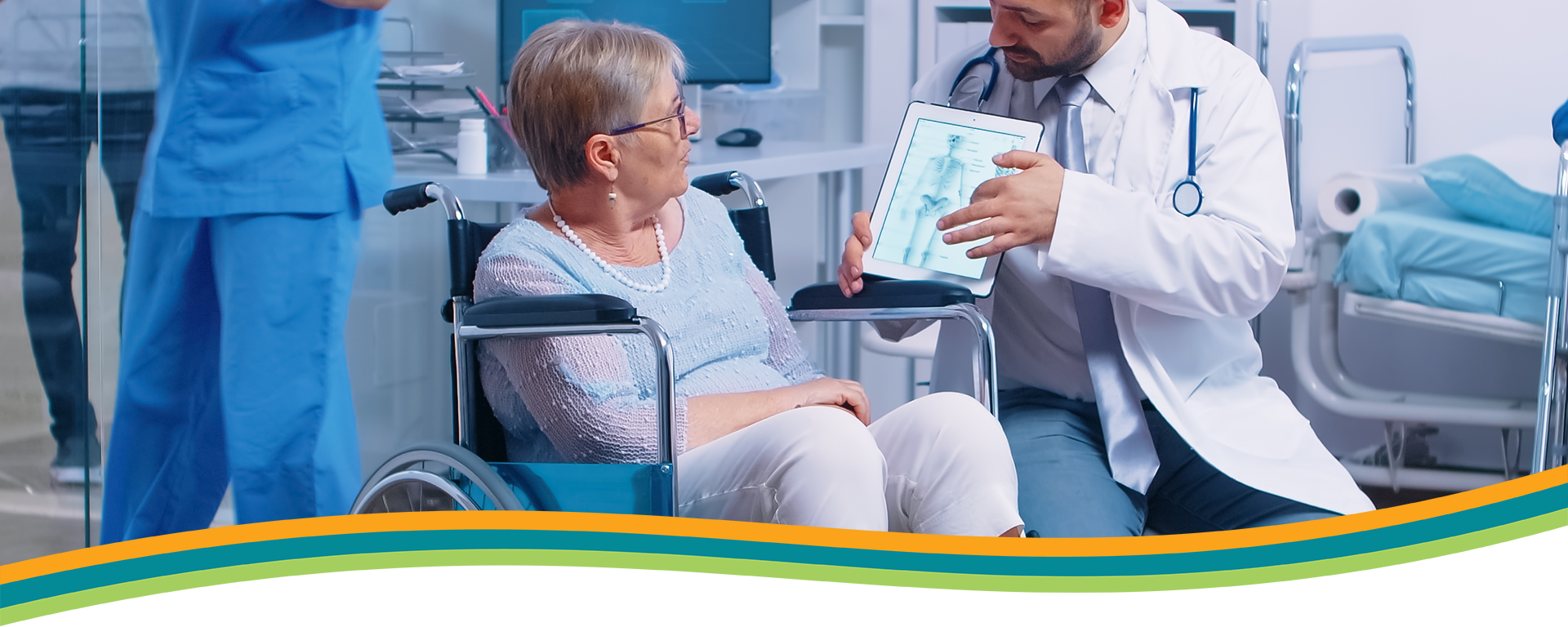Experiences and Outcomes of Patients who Attend our Self Consult Program
Since it started in 2016, more than 100 people have attended our osteoporosis group consultation (aka the ‘Self Consult Program’) and agreed to participate in research. We have been collecting data about people’s experience with this group program, and how this compares to a traditional one-on-one consultation with a specialist. We have found that the program is highly rated by patients and allows us to see a greater number of patients at the DHOC (and more quickly). We have also found that attending the Self Consult Program empowers people to confidently make decisions about whether or not to start osteoporosis treatment, and almost all patients are still confident with their decisions a year after the consultation.
Our team is also working with family medicine clinics in Calgary to develop a four-week group medical program called ‘Own Your Bones’. The Own Your Bones program is conducted entirely within the family medicine environment, and participants receive hands-on, practical education from physical therapists, dietitians, and physicians to help them self-manage their bone health. Own Your Bones is currently only offered at a few primary care networks throughout the city, but we plan to expand in 2024. If you are interested in attending, please check whether your family doctor is involved in the program.
Effects of High-Dose Vitamin D Supplementation on Bone Density and Bone Microarchitecture
Dr. Billington is part of the team at the Bone Imaging Laboratory who recently undertook a three-year randomized controlled trial evaluating the effects of high-dose vitamin D on bone health. The research team found that, when given to healthy adults who were not vitamin D deficient to begin with, high doses of vitamin D (4000 IU or 10,000 IU every day) did not have any benefits to the skeleton compared to a lower dose of 400 IU/day. In fact, the higher doses might actually be bad for the bones, but more research is needed on this.
This study is complete, but the team is continuing to analyze and publish data.
Predicting Osteoporotic Fractures using State-of-the-Art Imaging
Along with researchers at the Bone Imaging Laboratory, Dr. Billington is involved in a study which aims to determine whether we can identify people at the highest risk of hip fracture or other major osteoporotic fractures using a state-of-the-art imaging technique called ‘high resolution peripheral quantitative computed tomography’.
People who have had a recent hip fracture or other major osteoporotic fractures are eligible to enroll in this study.
Preventing Osteoporosis with Early Recognition (POWER) Program
Dr. Billington is working with Dr. Prism Schneider of orthopedic surgery to identify people who have recently had a fracture and ensure that these people receive an assessment of their risk of future fracture and an opportunity for treatment if their risk of having another fracture is high.
People who have had a recent fracture and been seen by a doctor at the Foothills Medical Centre Cast Clinic are eligible to enroll in this study.
Building a Fracture-Free Future Program
We are in the early phases of investigating possible treatments that women could receive around the time of menopause to help preserve their bone density and lower their risk of fracture later in life. Our group has conducted a modelling study which indicates that offering preventative therapy around the time of menopause could substantially reduce the number of women who have osteoporosis in their 60s and 70s.
Our research team recently conducted an online survey of more than 1000 women. We found that more than half of early menopausal women are interested in taking a proactive approach to bone health and would consider taking medication around the time of menopause to prevent future bone loss and fractures. We hope to start enrolling participants in a follow-up study very soon.
Strength Training for Osteoporosis in Early Menopause (STOP-EM) Study
Along with researchers from the Faculty of Kinesiology and the Bone Imaging Lab, Dr. Billington is investigating whether high-intensity resistance training can prevent bone loss in perimenopausal or early menopausal women. If you are a woman who is currently going through menopause or has gone through menopause in the past five years, you may be eligible to participate. Please contact us to learn more.
MisterFit Study
Dr. Billington is working with other researchers across the country to test a new, exercised-focused osteoporosis management app that is geared towards men. We will be enrolling 12 men in this year-long study between September 2023 and December 2024. Please contact us if you would like to learn more.
Bites for Bones Study
We recently completed a pilot study of a virtual nutrition program for bone health, called ‘Bites for Bones’. This 2-hour interactive Zoom session was developed in collaboration with the South Health Campus Wellness Kitchen and facilitated by our clinic dietitian, Heidi Piovoso. During the session, participants had the opportunity to either watch Heidi prepare several meals that are high in calcium and protein or cook along. We are analyzing data from our pilot and although the study is complete, we plan to offer the program through the DHOC in the future.
Own Your Bones Program
In collaboration with the department of Academic Family Medicine, the South Health Campus Wellness Centre and the Alberta Healthy Living Program, we have developed a 4-week comprehensive bone health group medical program that involves hands-on education from exercise professionals, registered dietitians, family physicians, and an osteoporosis specialist (Dr. Billington). We piloted this program in February 2023 and will be offering a second pilot session at South Health Campus in the fall of 2023. We hope to expand the availability of this program in the future. Please feel free to contact if you would like to learn more.


